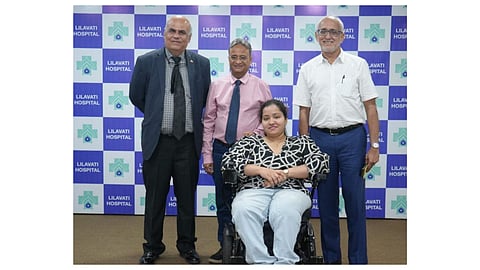

Lilavati Hospital & Research Centre Mumbai, has successfully performed a first-of-its-kind minimally invasive colonoscopic cecostomy on Merlyn D’mello, a 28 year-old IT professional living with spina bifida related neurogenic bowel. The innovative endoscopic technique created percutaneous cecum access with colonoscopic guidance and introduction of a 24 Fr PEG catheter, allowing self-performed antegrade colonic irrigation without open surgery or abdominal incisions.
The patient has been receiving medical attention since childhood for congenital spina bifida and has lifelong issues with severe constipation, incontinence, and reliance on caregiver-administered enemas. An earlier surgical procedure (Malone Antegrade Continence Enema/MACE) did not yield sustainable bowel control and necessitated advanced endoscopic management.
During a well-planned intervention, the hospital's multidisciplinary team, guided by Dr. Ravikant Gupta, and Dr. Santosh Karmarkar, used a colonoscopy-only approach to percutaneously access the cecum. This technique avoided laparotomy and minimized perioperative risk, despite prior abdominal surgeries and adhesions. The entire procedure was completed in less than one hour, marking a significant step forward in minimally invasive gastrointestinal surgery for complex neurogenic bowel cases.
Within 24 hours of the procedure, a spontaneous evacuation of stool was accomplished by an antegrade saline flush via the cecostomy tube. The patient reported minimal discomfort, required no postoperative analgesia, and was discharged in stable condition the next day.
“This procedure is a paradigm shift in how we treat complex cases of neurogenic bowel dysfunction,” said Dr Ravikant Gupta, Consultant, ENDOSCOPY Interventions, Lilavati Hospital “For patients with spina bifida, bowel control issues are not only a medical challenge but also a profound quality-of-life concern that affects independence and dignity. Colonoscopic cecostomy offers an incision-free, safe, and reliable option with reduced recovery time and long-term functional benefits. It provides new possibilities for patients who have exhausted conventional treatment approaches.”
Further, Dr. Santosh Karmarkar, Consultant Paediatric Surgeon & Spina Bifida Expert, Lilavati Hospital stated, “This patient has been treated since childhood and endured years of dependence on caregivers for bowel care. With this procedure, we have obtained permanent independence. Aside from the clinical success, the effect on the patient's self-confidence, capacity for independent living, and general psychosocial health is amazing. Medicine is not merely about technique medicine is about giving back dignity and autonomy to patients."
Dr Niraj Uttamani – COO, Lilavati Hospital & Research Centre said "At Lilavati Hospital, we take pride in being at the forefront of medical innovation that translates directly into better patient outcomes and quality of life. This groundbreaking colonoscopic cecostomy is not just a surgical success but a reflection of our commitment to advancing minimally invasive care in India. Our team’s expertise, combined with compassionate, patient-centered practice, continues to set new benchmarks in complex clinical management. We remain dedicated to empowering patients with the independence, dignity, and confidence they truly deserve."
Clinical Significance
Spina bifida, a birth defect of the neural tube, frequently results in lifelong neurogenic bowel and bladder dysfunction. India records over 30,000 new cases of spina bifida every year, making it a significant public health concern. Older treatments such as Malone's Antegrade Continence Enema (ACE) or open cecostomy, as effective as they are, carry higher complication risks, longer recovery periods, and reduced long-term success.
The endoscopic cecostomy procedure during colonoscopy in Lilavati Hospital demonstrates the possibility of having access to antegrade colon entirely by endoscopy. It is a minimally invasive method, which reduces tissue trauma, shortens hospital stay, and offers a reproducible option for difficult cases where traditional surgical methods have failed.
Lilavati Hospital is a major referral centre for SPINA BIFIDA. The Spina Bifida Foundation has partnered with the hospital for treatment of Spina Bifida
As one of Mumbai’s leading healthcare institutions, Lilavati Hospital continues to stand by the community with its dedication to saving lives and ensuring holistic recovery. With every case, Lilavati Hospital strengthens its promise of providing advanced, patient-centric healthcare to the citizens of Mumbai.
Also Read